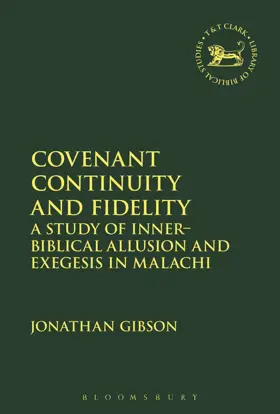

Covenant Continuity and Fidelity: A Study of Inner-Biblical Allusion and Exegesis in Malachi
in Library of Hebrew Bible/Old Testament Studies
Pages
272
Publisher
T&T Clark
Published
9/22/2016
ISBN-13
9780567665140
The core of Malachi's covenantal imagination is shaped by his reflection on an authoritative collection of source texts in the Hebrew Bible. The mention of people, nations and places, Deuteronomic terminology, and rare words and unique word/root combinations exclusive to Malachi and only a few other texts encourages the book to be read in the context of received biblical traditions and texts.
The diversity of methodologies used previously to analyse Malachi has resulted in confusion about the significance of the inner-biblical connections in the book of Malachi, which Gibson clarifies. His reading frees the text of Malachi from being overburdened by too many “intertexts”, and allows its central message of covenant to arise with greater clarity and force. Gibson reveals how Malachi's connections to earlier source texts are neither random nor causal; rather, they have been strategically employed to inform and shape his central theme of covenant continuity and fidelity.
The diversity of methodologies used previously to analyse Malachi has resulted in confusion about the significance of the inner-biblical connections in the book of Malachi, which Gibson clarifies. His reading frees the text of Malachi from being overburdened by too many “intertexts”, and allows its central message of covenant to arise with greater clarity and force. Gibson reveals how Malachi's connections to earlier source texts are neither random nor causal; rather, they have been strategically employed to inform and shape his central theme of covenant continuity and fidelity.
- Table of contents
- Preface
- Acknowledgements
- Abbreviations
- 1. Introduction: The Core of Malachi's Imagination
- 2. Methodology
- 3. "I Have Loved You": Inner-Biblical Allusion and Exegesis in Relation to the Patriarchal Covenant
- 4. "I Will Curse Your Blessings": Inner-Biblical Allusion and Exegesis in Relation to the Levitical Covenant
- 5. "Did He Not Make Them One?": Inner-Biblical Allusion and Exegesis in Relation to the Marriage Covenant
- 6. “Who Can Endure the Day of His Coming?”: Inner-Biblical Allusion and Exegesis in Relation to the New Covenant
- 7. “If I Will Not Open the Windows of Heaven”: Inner-Biblical Allusion and Exegesis in Relation to the Mosaic Covenant
- 8. “They Will Be My Special Possession”: Inner-Biblical Allusion and Exegesis in Relation to Covenant Renewal
- 9. “Turning Hearts”: Covenant Continuity and Fidelity (Malachi 3.22-24[4.4-6])
- 10. Conclusion: “For I, YHWH, Do Not Change”
- Bibliography
- Index